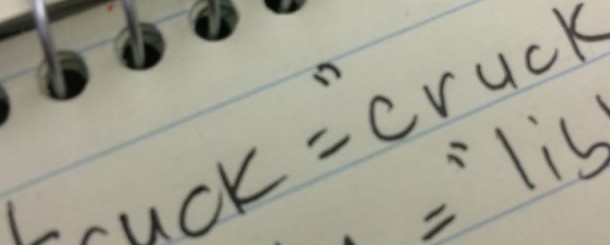Note from Hint Mama: At my now nearly 3-year-old daughter’s 2-year-old checkup, her doctor suggested I keep a list of words she doesn’t pronounce right. Then, he said, we’d be able to see how her speech has improved (or not improved) by her 3rd birthday and gauge whether she might need speech therapy. His advice piqued my interest in whether there are additional signs that a young child’s speech may need professional help, so I asked Michelle Lachman, a speech therapist who blogs at speechlanguage101.blogspot.com, to weigh in. Read her guest post on the subject below.
Many parents tend to focus on issues like getting a child to eat veggies or learn to read rather than on the small details of a child’s speech or language development. However, it’s important to remember that an untreated speech or language problem will likely impact future social and academic skills.
The prevalence of language delays in children between the ages of 2 and 7 ranges from 2.3% to 19%. While these percentages may not seem very high, speech delays can have an impact on later educational achievement, leading to increased difficulty reading in elementary school and increased incidence of attention and social difficulties.
So, the earlier any difficulties are identified and addressed, the less likely they will persist and impact other areas. But how can you tell if your child is having difficulty and isn’t just in the normal range of hard to understand?
Communication skills start when children are still babies, before they even say their first word. Keeping track of some early signs in children between the ages of birth to 4 is important for early detection of problems.
The three key areas to pay attention to are social communication, language development and speech development. Today’s hint is some milestones to watch for in each of these three areas to help you determine whether your young child may need therapy. Next to each milestone, I’ve noted the age at which most (monolingual) children acquire these skills.
Social Communication: Pay attention to how your child communicates socially. Does your child:
- Smile when her or she sees you (birth-3 months)
- Cry differently in different situations (2-3 months)
- Engage in joint attention tasks. Joint attention is the ability to share a common focus on something (people, objects, an event, etc.). For a young child these activities can include reaching to a caregiver to be picked up, pointing to a doll or looking at the same page in a book (This skill emerges at around 9 months, and is established by approximately 18 months)
- Enjoy playing peek-a-boo (7-12 months) and or hide and seek. Does he or she laugh, smile or get excited during these games?
Language Development: Watch to see if your child’s language skills (including understanding and producing words) are developing. Does your child:
- Listen when spoken to (7-12 months)
- Understand 3-50 words such as names of familiar people and objects (8-12 months)
- Follow simple commands and understand simple questions (“Roll the ball,” “Where’s your shoe?”) (12-24 months)
- Have a vocabulary of about 50 to 100 words (18-24 months)
- Put two words together (“more cookie,” “no juice,” “mommy book”) (12-24 months)
- Understand differences in meaning (“go vs. stop,” “big vs. little,” “up vs. down”) (24-36 months)
- Understand words for some colors (like red, blue, green) and shapes (circle, square) (36-48 months)
- Talk about what happened during the day with about 4 sentences at a time (36-48 months)
- Use many sentences that have 4 or more words (36-48 months)
Speech Development: Speech consists of the sounds your child makes to produce words. Does your child:
- Make pleasure sounds (cooing, gooing) (birth-3 months)
- Babble different sounds that are more speech-like, including p, b and m sounds (4-6 months)
- Imitate different speech sounds (7-12 months)
- Use k, g, f, t, d and n sounds (24-36 months)
- Speak and is understood by familiar listeners most of the time (24-36 months)
- Speak and people outside of the family usually understand child’s speech (36-48 months)
To be sure, it’s not always easy to know if your child will be a late-talker or if communication problems will continue, especially considering that speech or language delays are somewhat common. However, if your child’s speech or language development doesn’t seem to be on par with the average and has missed a number of milestones, and you are concerned, you’ll want to seek the advice of a certified speech language therapist in your area.
What else do you want to know about children and speech development?
Michelle Lachman, M.S., CCC-SLP, is a state and nationally certified speech language therapist. She has extensive experience evaluating and treating various speech and language disorders for children and adults. She has worked in California public schools and adult rehabilitation centers integrating clinical expertise, evidence based practice and client values. Michelle received her M.S from the City University of New York. She can be contacted at mlachman.speech@gmail.com and her Web site, michellelachman.wix.com/speech, and you can read more about speech and language on her blog: speechlanguage101.blogspot.com.
Follow Hint Mama on Facebook and Twitter, and read more about her and her disclosures.







I know it’s normal for young children to occasionally make up words for things (like a favorite toy). What about insisting on saying whole sentences in nonsense words? Or answering questions in made-up words (never the same word)? This behavior’s new to me, so I’m given to wonder what’s up. (My child is 35 months and otherwise normally verbal.)